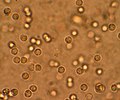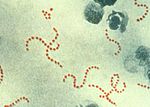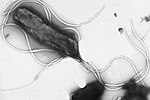from an infection. Infections can be caused by a wide range of pathogens, most prominently bacteria and viruses. Hosts can fight infections using their...
117 KB (12,746 words) - 19:33, 20 October 2024
Bloodstream infections (BSIs) are infections of blood caused by blood-borne pathogens. The detection of microbes in the blood (most commonly accomplished...
35 KB (3,681 words) - 09:15, 23 May 2024
Pinworm infection (threadworm infection in the UK), also known as enterobiasis, is a human parasitic disease caused by the pinworm, Enterobius vermicularis...
37 KB (3,626 words) - 02:02, 6 November 2024
A staphylococcal infection or staph infection is an infection caused by members of the Staphylococcus genus of bacteria. These bacteria commonly inhabit...
13 KB (1,350 words) - 10:08, 11 November 2024
transmitted infection (STI), also referred to as a sexually transmitted disease (STD) and the older term venereal disease (VD), is an infection that is spread...
84 KB (8,243 words) - 06:26, 19 October 2024
Fungal infection, also known as mycosis, is a disease caused by fungi. Different types are traditionally divided according to the part of the body affected;...
25 KB (2,302 words) - 12:21, 25 July 2024
A urinary tract infection (UTI) is an infection that affects a part of the urinary tract. Lower urinary tract infections may involve the bladder (cystitis)...
78 KB (8,223 words) - 19:31, 12 November 2024
Human papillomavirus infection (HPV infection) is caused by a DNA virus from the Papillomaviridae family. Many HPV infections cause no symptoms and 90%...
145 KB (15,967 words) - 01:51, 19 October 2024
An opportunistic infection is an infection caused by pathogens (bacteria, fungi, parasites or viruses) that take advantage of an opportunity not normally...
34 KB (3,137 words) - 19:26, 28 October 2024
HIV/AIDS (redirect from HIV infection)
treatment the infection can interfere with the immune system, and eventually progress to AIDS, sometimes taking many years. Following initial infection an individual...
211 KB (21,185 words) - 04:17, 28 October 2024
An odontogenic infection is an infection that originates within a tooth or in the closely surrounding tissues. The term is derived from odonto- (Ancient...
7 KB (717 words) - 17:03, 31 October 2024
hospital-acquired infection, also known as a nosocomial infection (from the Greek nosokomeion, meaning "hospital"), is an infection that is acquired in...
57 KB (5,735 words) - 19:34, 19 October 2024
Hookworm infection is an infection by a type of intestinal parasite known as a hookworm. Initially, itching and a rash may occur at the site of infection. Those...
73 KB (9,212 words) - 09:41, 5 September 2024
HIV (redirect from Hiv infections)
life-threatening opportunistic infections and cancers to thrive. Without treatment, the average survival time after infection with HIV is estimated to be...
123 KB (14,115 words) - 13:33, 14 October 2024
Postpartum infections, also known as childbed fever and puerperal fever, are any bacterial infections of the female reproductive tract following childbirth...
38 KB (4,221 words) - 03:38, 15 October 2024
Group A streptococcal infections are a number of infections with Streptococcus pyogenes, a group A streptococcus (GAS). S. pyogenes is a species of beta-hemolytic...
34 KB (3,842 words) - 22:32, 19 October 2024
Candidiasis (redirect from Thrush (infection))
Candidiasis is a fungal infection due to any species of the genus Candida (a yeast). When it affects the mouth, in some countries it is commonly called...
66 KB (6,393 words) - 04:51, 2 November 2024
Chest infection may refer to: Upper respiratory tract infection Lower respiratory tract infection Bronchitis Pneumonia Pleurisy Tuberculosis This disambiguation...
197 bytes (49 words) - 22:02, 21 November 2018
Helicobacter pylori (redirect from Helicobacter infections)
disorders. Gastric disorders due to infection begin with gastritis, or inflammation of the stomach lining. When infection is persistent, the prolonged inflammation...
148 KB (16,619 words) - 13:12, 10 November 2024
microbiology, the multiplicity of infection or MOI is the ratio of agents (e.g. phage or more generally virus, bacteria) to infection targets (e.g. cell). For...
4 KB (597 words) - 02:45, 8 August 2024
Clostridioides difficile infection (CDI or C-diff), also known as Clostridium difficile infection, is a symptomatic infection due to the spore-forming...
101 KB (10,565 words) - 03:11, 19 October 2024
Adenovirus infection is a contagious viral disease, caused by adenoviruses, commonly resulting in a respiratory tract infection. Typical symptoms range...
28 KB (2,734 words) - 14:55, 1 March 2024
Vaginal yeast infection, also known as candidal vulvovaginitis and vaginal thrush, is excessive growth of yeast in the vagina that results in irritation...
30 KB (2,992 words) - 10:17, 26 June 2024
Epidemiology and Infection is a peer-reviewed medical journal that contains original reports and reviews on all aspects of infection in humans and animals...
2 KB (74 words) - 11:24, 11 September 2024
Respiratory tract infections (RTIs) are infectious diseases involving the lower or upper respiratory tract. An infection of this type usually is further...
20 KB (1,918 words) - 17:17, 26 August 2024
COVID-19 (redirect from COVID-19 infection)
of SARS-CoV-2 infections. While very young children have experienced lower rates of infection, older children have a rate of infection that is similar...
288 KB (33,185 words) - 16:47, 7 November 2024
Necrotizing fasciitis (redirect from Necrotizing soft tissue infections)
Necrotizing fasciitis (NF), also known as flesh-eating disease, is a bacterial infection that results in the death of parts of the body's soft tissue. It is a...
45 KB (4,680 words) - 13:18, 6 November 2024
Pseudomonas aeruginosa (redirect from Cutaneous pseudomonas aeruginosa infection)
mechanisms, and its association with serious illnesses – hospital-acquired infections such as ventilator-associated pneumonia and various sepsis syndromes....
92 KB (10,005 words) - 19:22, 7 November 2024
Protozoan infections are parasitic diseases caused by organisms formerly classified in the kingdom Protozoa. These organisms are now classified in the...
32 KB (3,716 words) - 02:51, 17 September 2024
Anaerobic infections are caused by anaerobic bacteria. Obligately anaerobic bacteria do not grow on solid media in room air (0.04% carbon dioxide and 21%...
36 KB (4,781 words) - 00:52, 25 September 2024
























